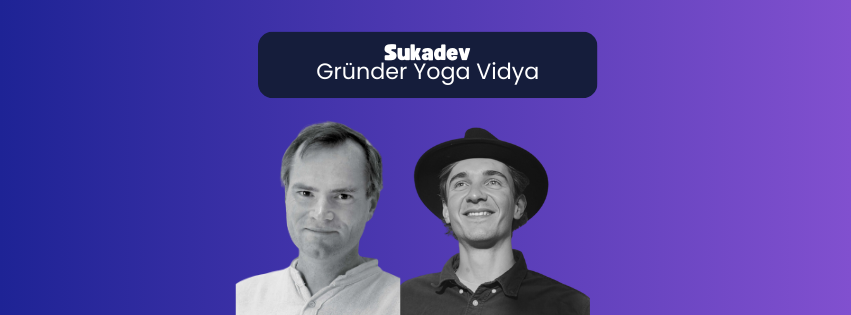Fabien Matthias, co-founder of Nidisi and Ecopals, joined Manuel on the Why, Not How podcast to share his journey from a curious student in Nepal to an entrepreneur committed to creating positive social impact. His story highlights the intersection of social entrepreneurship, sustainability, and the power of building purpose-driven businesses, especially in the context of the global south.
From Nepal to Entrepreneurship
Fabien’s path to entrepreneurship began in an unconventional way. After finishing high school, he wanted to break free from the rigid structures of academia and experience something entirely different. His journey took him to Nepal, where he immersed himself in a cultural and humanitarian experience that would significantly shape his future endeavors.
Initially, Fabien joined a program where he could volunteer to teach English, but he quickly realized that the conventional development aid model had its flaws. He found himself questioning the effectiveness of the help he was offering. The educational experience turned out to be more about creating dependency rather than empowering individuals to create change themselves. This realization became a turning point in his thinking, and as the devastating earthquake hit Nepal in 2015, he found himself part of a relief effort that involved distributing supplies and offering direct support to communities affected by the disaster.
Founding Nidisi: Building with Purpose
Fabien’s reflections on the aid model led him to co-found Nidisi, a social enterprise aimed at developing sustainable solutions in Nepal. Nidisi started as a nonprofit project but evolved into a gGmbH (a nonprofit limited liability company) under a responsibility ownership model, which Fabien strongly believes is crucial for companies with a social mission.
One of Nidisi’s most impactful projects was focused on addressing the growing problem of plastic waste. The team began by experimenting with converting plastic into a valuable material for construction. By integrating recycled plastic into the production of asphalt, they found a way to help Nepal reduce plastic pollution while also improving the longevity and durability of the roads. This innovation quickly gained attention not only in Nepal but also in the global market, demonstrating the potential for impact-driven businesses to scale internationally.
Ecopals: Bridging the Gap Between Innovation and Sustainability
In parallel with Nidisi, Fabien co-founded Ecopals, a venture focused on sustainable construction solutions. The company explored ways to use recycled plastics to create more durable road materials, aiming to reduce both plastic waste and the reliance on traditional, unsustainable resources.
Despite the potential of the business and its unique technology, Fabien eventually stepped back from Ecopals to focus on Nidisi’s mission. He realized that he could not effectively manage two early-stage ventures simultaneously. This decision was motivated not only by his passion for the nonprofit sector but also by the challenges of balancing investor expectations in a for-profit venture with his commitment to the social good. At Ecopals, the pressure from investors to prioritize financial returns over the company’s original sustainability mission was a critical factor that led to his departure.
The Role of Responsibility Ownership in Sustainable Startups
A key element of both Nidisi and Ecopals is the responsibility ownership model. This model prevents external investors from taking control of the company and allows it to remain committed to its social mission. Fabien views this model as a critical step towards creating impact-driven ventures that are not solely focused on profit maximization but on sustainable, long-term change.
By choosing this ownership model, Fabien and his team ensure that their businesses remain aligned with their values. The decision to incorporate responsibility ownership was not only about protecting the company’s mission but also about fostering a culture of trust and autonomy within the team. This commitment to ethical business practices has been crucial to their ability to create impactful solutions in a challenging market.
Fabien’s Approach to Entrepreneurship
Fabien’s story offers valuable lessons for early-stage entrepreneurs looking to create a purpose-driven startup. One of his key insights is the importance of continually revisiting and reaffirming the “why” behind your venture. Entrepreneurs often get caught up in the day-to-day grind and lose sight of their original vision. For Fabien, it’s essential to focus on impact, not just growth.
Additionally, he emphasizes the importance of taking small, consistent steps. He advocates for the idea of continuous improvement, believing that sustainable success comes from gradual progress rather than drastic changes. This mindset aligns with his belief in creating businesses that have a positive social impact while remaining financially viable and committed to their mission.
The Future of Nidisi and Fabien’s Next Steps
Fabien’s work is far from finished. After reducing his working hours to a four-day week, he is focusing more on his personal growth and education. His future projects are likely to involve expanding his influence in the field of social entrepreneurship and sustainable development.
Fabien also advocates for a revolution in education, where emotional intelligence and cooperation are at the forefront of learning. He believes that by teaching young people to work together and understand their feelings, we can create a more compassionate and sustainable world.
Top 5 Key Takeaways from Fabien’s Journey:
- Sustainability is the Core: To build a meaningful business, entrepreneurs must stay committed to their social mission and ensure that their actions align with their values, even when external pressures arise.
- Small Steps Lead to Big Impact: Continuous improvement, not radical changes, is key to achieving long-term goals. The 1% method—making incremental progress every day—can have a huge cumulative effect.
- Challenge the Status Quo: Don’t be afraid to question established norms. Whether in development work or business practices, disruption often leads to innovation and more effective solutions.
- The Importance of Team Culture: Building a strong, value-driven team is essential for scaling impact-driven ventures. Creating a culture of collaboration and empowerment leads to better results and fosters ownership within the team.
- Responsibility Ownership is the Future: The responsibility ownership model ensures that businesses stay true to their mission and values while remaining financially sustainable. It’s a model that should be considered for purpose-driven startups focused on long-term impact.
Fabien’s story with Nidisi and Ecopals is an inspiring example of how entrepreneurs can build impact-driven ventures that not only solve environmental challenges but also contribute to social good. By integrating values of responsibility ownership and sustainability, these businesses show that it is possible to scale while staying true to a higher purpose.



